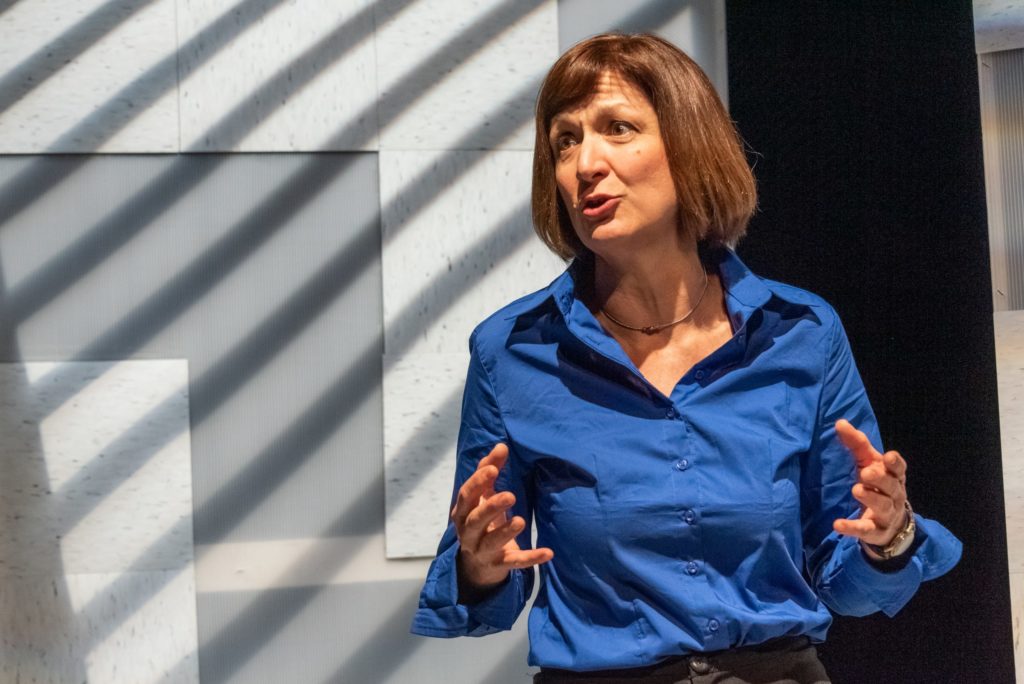
Anastasia Olowin, Robyn Unger; Photo by Stratton McCrady.
Presented by Boston Playwrights’ Theatre and the Boston University College of Fine Arts School of Theatre
By Caity-Shea Violette
Directed by Blair Cadden
Intimacy choreography by Jesse Hinson
COVID-19 Safety Management by Jay Eddy
Featuring: Anastasia Olowin, Robyn Unger, Lisa Tucker, Lila Heller, Isabel Van Natta
The digital program
February 17-27, 2022
Boston Playwrights’ Theatre
949 Commonwealth Avenue
Boston, MA 02215
BPT on Facebook
Critique by Kitty Drexel
BOSTON — Rx Machina by Caity-Shea Violette is one of two plays about addiction currently running in Boston. It’s no coincidence. COVID-19 has decimated our mental health.
The modern human, when faced with a medical crisis and no affordable solutions, will turn to legal and illegal self-medicating. The CDC’s website says that the opioid epidemic is a public health crisis. The news, any channel, will confirm this statement.
The CDC says, “Drug overdoses have dramatically increased over the last two decades, with deaths increasing more than four times between 1999 and 2017. In 2017, more than 70,000 people died from drug overdoses, making it a leading cause of injury-related death in the United States. Of those deaths, about 68 percent involved a prescription or illicit opioid.”
Nina (Robyn Unger) is a good doctor working striving for work/life balance at a medical institution that doesn’t believe in personal boundaries. Upper management keeps its offices off-site and its employees out of mind. Maren (Anastasia Olowin) is a pharma rep with loosey-goosey morales, the predatory instincts of a terrier, and a girlfriend Stevie (Lila Heller) who tries to love her anyway.
As Nina and Maren get to know each other better in and outside the office (and their clothes), they experience first-hand the consequences of unfettered opioid distribution among the masses. Isabel Van Natta is Hannah, a college student living with chronic pain. Lisa Tucker is the ass-kicking, no prisoner-taking, danish-coveting hospital administrator Deb who advocates for her team in a money-hungry industry.
Healthcare shouldn’t be profitable. The health and care of human beings should not be a money-making industry. But it is.

Isabel Van Natta (foreground), Lila Heller (background); Photo by Stratton McCrady.
The Love Ballet in the first act is incongruent with the rest of the play. While it handsomely conveys the physical romance between Nina and Maren and the actors do a fine job performing it, the ballet doesn’t work within the context of the entire play. It is too unique.
The brief movement sequences that open the acts are similar in style but aren’t enough to cement the Love Ballet’s abstraction within the play. The ballet could work if movement sequences were integrated into the play earlier and then reinforced in later romantic interludes. As presented now, the ballet sticks out as incompatible storytelling.
Rx Machina features some great work from its cast. As a gentle reminder, students please keep your energy up; don’t drop the ends of your lines; project your voice to the back of the theatre because the bodies in the audience absorb sound. You’re doing a good job.
Rx Machina reminds us that patients in pain can’t advocate for themselves as well as they would when they are pain-free. Rushed doctors weighed down with paperwork can’t make thoughtful, accurate diagnoses. Pharma reps with quotas to meet can’t see humans; they must see numbers. The upper echelons of for-profit health count on these debilitating circumstances to increase their profits which pleases their investors.

Lisa Tucker; Photo by Stratton McCrady.
The investors are the ones driving the action but spend the least amount of time with consumers. Rx Machina makes this crystal clear by giving characters Hannah and Stevie the least amount of stage time. Were these characters given more time with Nina and Maren, perhaps everyone would have a more positive outcome. It is never a waste of resources to invest in another’s humanity.
At the end of Rx Machina, the character Hannah asks audience members to please donate to the New England Recovery Center in Westborough, Mass. if they can. A search via Google for the “New England Recovery Center + donation” found no results. Searching the NERC website for “donation” also yielded no results.
Should attendees of Rx Machina wish to make a donation towards opioid recovery programs, please consider donating to one of these New England organizations: Bay Cove Human Services, Spruce Mountain Inn, or many other organizations found on the SAMHSA.gov Behavioral Health Treatment Services Locator website.
